Mastering the Art: How to Build a Community Online and Thrive

Ever wondered why the buzz around building online communities seems to be growing louder by the day? Well, it's no surprise if you're a coach looking to amplify your impact. Learning how to build a community online isn't just a trend—it's becoming a core part of successful coaching practices all around the globe.
Why, you ask?
Imagine having a digital space where your clients can connect, inspire, and support each other 24/7. A space where your unique coaching philosophy thrives and engagement isn't just a metric but a tangible, thriving reality.
Understanding how to build a community online opens doors to endless possibilities. We're talking about improved client retention, enriched relationships, and an opportunity to reach more people than ever before.
Ready to explore this dynamic landscape?
Join us as we delve into the 'whys' and 'hows' of crafting an online community that doesn't just exist but thrives. It's about connection, growth, and taking your coaching to the next level. Let's dive in!
Here’s what we’ll cover in this guide:
What is an Online Community?
Discover what an online community is all about, and explore real examples in various coaching fields.Unlocking Potential: Why Should a Coach Build an Online Community?
Find out why building an online community is a must for coaches looking to connect and grow.Exploring Options: Types of Online Communities and How Coaches Can Use Them
Uncover the different types of online communities and how each one can be tailored to a coach's specific needs.Brick by Digital Brick: How to Build an Online Community
Your step-by-step guide to building an online community from the ground up, complete with examples and tips.Fanning the Flames: Keeping the Community Engaged and Active
Learn the secrets of keeping your community engaged and thriving with strategies for participation, content, and positivity.Crunching the Numbers: Measuring the Success of Your Online Community
Understand the key performance indicators, tools, and methods to gauge the success of your community and continuously improve.
What is an Online Community?
So, you've heard the buzz and the success stories, but what is an online community? Let's break it down so we're all on the same digital page.
An online community is more than just a group of people on a Facebook page or a collection of followers on Twitter. It's a virtual gathering place where individuals with shared interests, goals, or values come together to connect, engage, and interact. Think of it as a digital coffee shop where everyone knows your name and the conversation flows effortlessly.
When it comes to coaching, building an online community means crafting a space that mirrors your unique coaching style. It's not about numbers but connection, trust, and growth.
Whether it's a forum where your clients can share their successes and struggles or a membership site filled with resources and live Q&A sessions, the right community feels like home.
Need proof? Here are some real-life examples:
1. The Smart Passive Income Community:
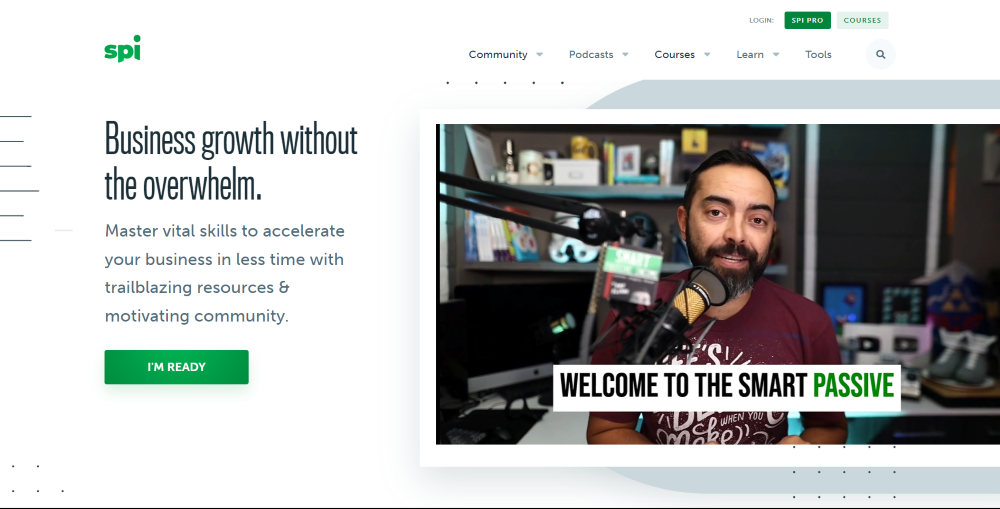
Created by Pat Flynn, the The Smart Passive Income Community focuses on entrepreneurship, online business, and financial independence. It offers courses, podcasts, and an engaged forum where members can learn and connect.
2. Danielle LaPorte's Heart-Centered Membership:
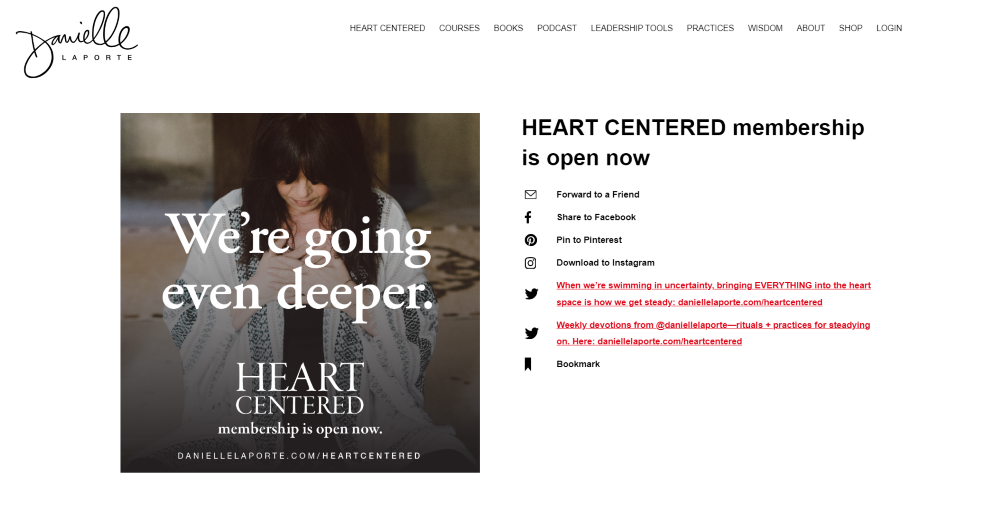
Focusing on personal growth, spirituality, and holistic well-being, Danielle LaPorte's community offers resources, courses, and a supportive space for individuals seeking more profound connections with themselves and others.
3. The Health Coach Institute Community:
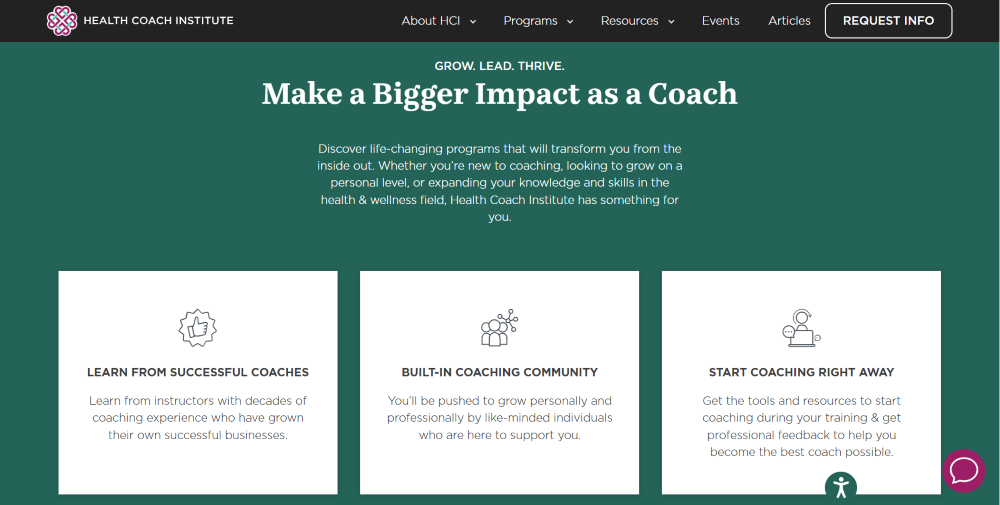
Specifically tailored for health and wellness coaches, The Health Coach Institute Community offers education, resources, and networking opportunities. The platform provides an environment for aspiring health coaches and those looking to improve their well-being.
4. The Art of Charm Communication Accelerator:
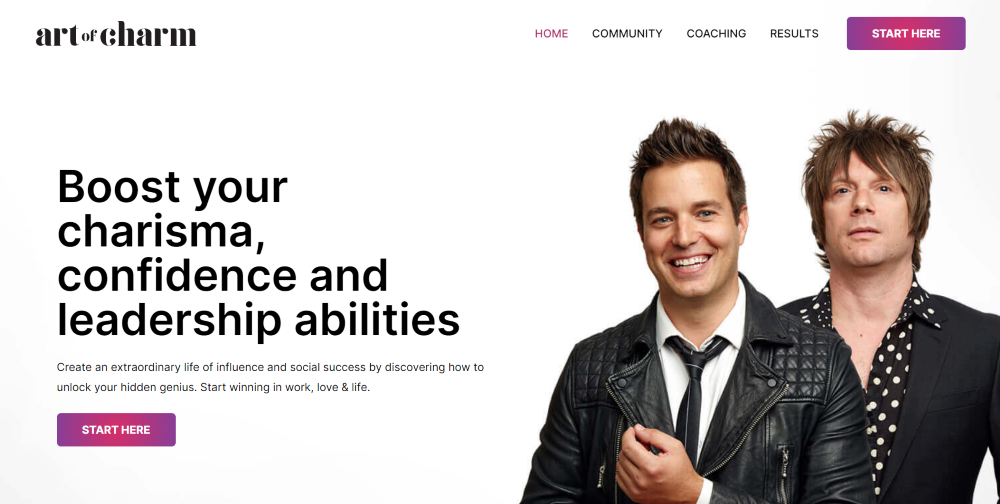
Aimed at professional and social success through improved communication and networking skills, The Art of Charm offers coaching, podcasts, courses, and an active community where members can practice and enhance their interpersonal skills.
5. Lewis Howes' School of Greatness Academy:
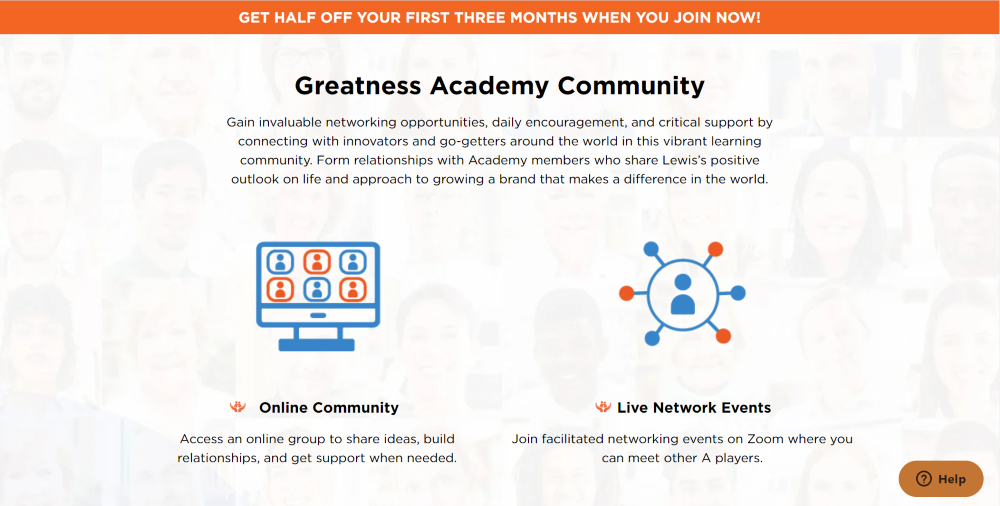
Lewis Howes has created a thriving community centered around personal development and life coaching. Through courses, live sessions, and a community forum, members of The Greatness Academy can actively engage with one another, finding support and inspiration.
6. The Tony Robbins Inner Circle Community:
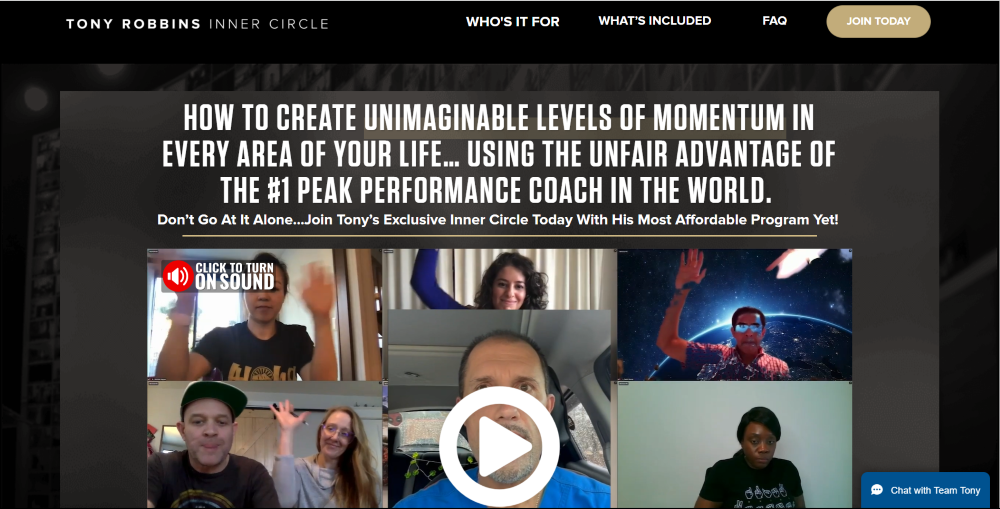
Tony Robbins, a well-known life and business coach, has built an extensive online community via Inner Circle. His platform offers various resources, events, and connections, providing abundant opportunities for personal and professional growth.
7. Marie Forleo’s B-School Community:

Aimed at entrepreneurs, the B-School community offers courses, mentorship, and an active forum for business coaching. It's a place where small business owners and aspiring entrepreneurs can learn, grow, and connect.
Want to build your own community? Clarityflow offers you Spaces. Launch your group coaching program and allow members to learn with one another and with you.
In essence, when discussing how to build a community online, we're not just discussing technology or marketing tactics. It's about creating a human connection in a digital world. It's about fostering a sense of belonging, a place where your coaching philosophy shines and your clients feel seen, heard, and supported.
So, whether you're a seasoned pro looking to enhance your online presence or just starting, understanding the ins and outs of online communities can be your game-changer. It's time to explore the potential and make your digital mark. Shall we continue?
Unlocking Potential: Why Should a Coach Build an Online Community?
So, we've explored what an online community is and seen some thriving examples in action. But you might still be wondering, "Why should I, as a coach, invest time and energy into building an online community?" Great question! Let's unravel the mystery together.
Increased Engagement: Ever felt like you're talking to a virtual wall on social media? With an online community, you're connecting with people who are genuinely interested in what you have to say. They're not just followers but engaged members who share, contribute, and participate.
Wider Reach: Building an online community breaks down geographical barriers. Whether your audience is next door or across the globe, you can connect with people who resonate with your coaching philosophy. It's about embracing diversity and expanding your impact.
Opportunity for Feedback: Want to know what your clients really think? An online community fosters an environment of honest feedback and continuous improvement. It's like having a permanent focus group ready to help you fine-tune your coaching techniques.
Creates a Support Network: Your community members aren't just clients; they become support networks for each other. It's where peer encouragement flourishes, creating a ripple effect that enhances your coaching results.
Continuous Learning: Think of your community as a dynamic learning hub. With discussions, Q&As, and shared experiences, it becomes a space where learning never stops—both for you and your members.
Building Authority: Showcasing your expertise within a dedicated community helps establish you as an authority in your field. It's not just about promoting your services but providing value that underscores your reputation as a trusted coach.
Monetization Opportunities: A thriving community opens doors for premium memberships, exclusive content, courses, and other value-added services. It's not just about revenue but offering tailored experiences that members are happy to invest in.
A Sense of Belonging: Last but not least, an online community builds a sense of belonging. It's not just a platform; it's a home where your clients feel seen, heard, and valued. And that's a connection that goes beyond coaching sessions.
Building an online community might seem daunting, but the rewards are profound. It's about connecting at a deeper level, innovating your coaching practice, and creating a space alive with possibilities.
Exploring Options: Types of Online Communities and How Coaches Can Use Them
Alright, now that we've delved into the 'why,' let's get into the 'what.' Not all online communities are created equal, and that's good! Different strokes for different folks, right? As a coach, you've got various platforms and formats to choose from, each with its own flavor and flair.
Let's explore some of the most popular types:
1. Forums
What They Are: Think of forums as the town halls of the internet. They're structured, organized, and topic-driven, allowing for deep discussions and connections.
How Coaches Can Use Them: Got a specialized coaching niche? A forum can be a fantastic way to build a community around specific topics or challenges. You can host Q&A threads, share resources, and facilitate peer-to-peer support. It's a dialogue-driven space that fosters engagement.
Example: Reddit's r/lifecoaching is a space where coaches and those interested in life coaching can exchange ideas.
2. Social Media Groups
What They Are: Facebook Groups, LinkedIn Groups, or Twitter Chats are the go-to platforms for less formal, more dynamic interactions.
How Coaches Can Use Them: Want to create a casual space where your clients can drop in, share wins, ask questions, and just hang out? Social media groups offer an easy-entry point, making them great for community-building and real-time interaction.
Example: Facebook has many private groups tailored to coaching, such as "The Coaching Jungle" for coaching professionals.
3. Membership Sites
What They Are: Membership sites are exclusive clubs offering access to specific content, courses, webinars, or events for paying or registered members.
How Coaches Can Use Them: Looking to monetize your expertise and offer value-added services? A membership site allows you to create tailored experiences, provide personalized support, and foster a committed community.
Example: Brendon Burchard's High Performance Academy offers exclusive content and training.
4. Collaborative Platforms
What They Are: These real-time collaboration tools allow members to communicate, share files, and work together. Think Slack and Discord channels.
How Coaches Can Use Them: If you're coaching teams or groups and want to create a space that facilitates collaboration and real-time support, these platforms are for you. They're like virtual co-working spaces.
Example: Slack communities like "Mind the Product" are used for collaboration among professionals, including coaches.
5. Content-Based Communities
What They Are: These communities center around specific content like videos, podcasts, or blogs. These could be on platforms like YouTube or Podcast communities.
How Coaches Can Use Them: If you love sharing insights through multimedia, this might be your jam. Create content that is relevant to your audience and foster engagement through comments, likes, and shares.
Example: Marie Forleo's YouTube channel is a thriving community for aspiring entrepreneurs and business coaches.
6. Hybrid Communities
What They Are: A mix of the above, tailored to your unique coaching style and audience's needs.
How Coaches Can Use Them: Feel like mixing it up? A hybrid community allows you to combine the best of various platforms to create a multi-dimensional space that resonates with your coaching practice.
Example: Lewis Howes' School of Greatness Academy combines courses, live sessions, forums, and social media.
Deciding on the right type of community depends on your coaching style, the needs of your clients, and the nature of your practice. It's like choosing the perfect outfit that makes you feel confident, comfortable, and utterly you.
But here's the cool part: there's no one-size-fits-all. You can experiment, play around, and discover what feels right for you and your community.
Brick by Digital Brick: How to Build an Online Community
Let's jump right into the exciting part! Building an online community. If you think this is a daunting task, don't worry, we've got you covered. Grab your virtual toolkit, and let's get started:
1. Identify Your Target Audience:
Know Who You're Talking To: Are you reaching out to fitness enthusiasts, career changers, or new entrepreneurs? Define this first.
Understand Their Needs: Figure out their desires and struggles.
Example: If you're a health coach, your target might be busy professionals looking for wellness strategies.
Tip: Create imaginary profiles representing your ideal community members.
2. Choose the Right Platform:
Consider Your Audience's Habits: Where do they hang out online?
Align with Your Goals: Choose a platform that fits your mission.
Example: A life coach targeting millennials might find success with an Instagram community.
Tip: Experiment with different platforms to see what resonates with your audience.
3. Set Community Rules and Guidelines:
Create a Safe Space: Outline clear guidelines to foster respect.
Be Clear About Expectations: Define what's acceptable and what's not.
Example: A pinned post in your LinkedIn Group that outlines professional conduct rules.
Tip: Regularly remind members of the guidelines to maintain community standards.
4. Strategies for Attracting Initial Members:
Leverage Your Existing Network: Invite clients, colleagues, or friends.
Create Exclusive Content: Something they can't find anywhere else.
Example: Offering an exclusive eBook to the first 100 members of your coaching community.
Tip: Personal engagement is vital initially; respond to every comment and post.
5. Promote Your Online Community:
Use Social Media: Share across various channels.
Collaborate with Influencers: Find personalities that align with your audience.
Example: Partnering with a well-known business influencer for a joint webinar if you're a business coach.
Tip: Regularly offer incentives and exclusive content to keep attracting new members.
Pro Tips: Making Your Community Shine
Building an online community is like tending a garden; it takes continuous care and attention. Here are some bonus tips to make your community thrive:
Encourage Engagement: Ask questions, run polls, and make your members feel involved.
Monitor and Adapt: Keep an eye on what works and what doesn't, and be ready to pivot.
Celebrate Success: Acknowledge milestones, both big and small, within your community. For example, monthly highlights of member successes within your career coaching community can foster a supportive environment.
Remember: Building a community is a journey, not a sprint. Enjoy the process and learn along the way.
So there you have it, a roadmap to building your very own online community. Whether you're jazzed or a bit jittery, know that this path is filled with opportunities, connections, and growth.
Fanning the Flames: Keeping the Community Engaged and Active
Alright, superstar coach, we've built our online community! Now comes the thrilling and challenging part: keeping that community engaged and active. Think of it as a garden just starting to bloom; you've got to water it, nurture it, and maybe even talk to it a little (hey, whatever works!). Here's how we'll keep those digital flowers blossoming:
Regular, Valuable Content:
Stay Consistent: Your members joined for a reason. Keep them hooked with regular posts, updates, and valuable insights tailored to their interests.
Share Real Success Stories: As a coach, you have a treasure trove of inspiration. Share it!
Example: If you're a business coach, weekly live Q&A sessions or case studies can be gold.
Tip: Plan your content using a content calendar, but leave room for spontaneity.
Strategies for Active Participation and Discussion:
Ask Open-Ended Questions: Get people talking. Ask questions that need more than a one-word answer.
Create Challenges or Contests: People love a little friendly competition!
Example: Running a monthly fitness challenge if you're a health coach can boost participation.
Tip: Acknowledge and celebrate those who actively participate. Recognition goes a long way!
Dealing with Conflict and Ensuring a Positive Environment:
Set Clear Boundaries: Make sure everyone knows what's acceptable.
Handle Conflicts with Grace: If a conflict arises, address it privately, then publicly if needed.
Example: Crafting a set response to negative comments that keeps the conversation respectful.
Tip: Foster an environment where disagreements can happen, but personal attacks are not tolerated.
The Role of Community Moderators or Leaders:
Choose Wisely: If your community grows, you might need help. Choose moderators who share your values.
Empower Them: Provide clear guidelines and allow them to handle situations autonomously.
Example: A life coach might have senior members lead weekly discussion threads.
Tip: Regular check-ins with your moderators ensure alignment and provide support.
A Note on Keeping the Momentum:
Keep Evolving: What worked yesterday might not work tomorrow. Stay fresh and be willing to adapt.
Encourage Member-Led Initiatives: Your members may have fabulous ideas. Embrace them!
Example: Encourage members to host their own live sessions or workshops within the community.
Tip: Regularly seek feedback from your community. They'll tell you what they love and what they need more of.
So there it is! The recipe for a lively, loving, and lasting online community. It's about showing up consistently, offering value, handling challenges with grace, and knowing when to lead and when to let others take the stage.
Remember, you've got what it takes. And as any great coach knows, the game's never really over; it just keeps getting more exciting.
Crunching the Numbers: Measuring the Success of Your Online Community
Okay, coach, we're nearing the finish line, but there's one critical leg left in this digital relay: measuring success. It's like a post-game analysis. How do you know if you've won if you don't know the score?
Here's how to keep track of your community's wins and where it might need a little extra coaching:
Key Performance Indicators (KPIs) for Online Communities:
Engagement Rates: Are your members actively participating? Are they liking, sharing, and commenting?
Membership Growth: How quickly is your community growing? Are new members sticking around?
Customer Satisfaction: Are you meeting the needs of your members?
Example: A career coach could measure success by the number of members who land new jobs.
Tip: KPIs will vary based on your community's goals. Keep them aligned.
Tools and Methods to Measure Engagement and Member Satisfaction:
Use Analytics Tools: Platforms like Facebook Groups have built-in analytics. Dive in!
Surveys and Feedback Forms: Regularly ask for member input.
Example: Using Google Analytics to track how many members visit your coaching community's blog.
Tip: Don't overcomplicate it. Start with a few key metrics and adjust as needed.
Strategies for Continuous Improvement Based on Feedback and Data:
Embrace Feedback: See it as a treasure map to what your community truly desires.
Adapt and Implement: Use the data and feedback to make informed decisions.
Iterate Regularly: Your community will grow and change. Be willing to evolve with it.
Example: If a monthly webinar isn't drawing crowds, try breaking it into weekly bite-sized sessions.
Tip: Remember, numbers tell part of the story. Pair them with member feedback for a complete picture.
So, there it is, your digital scoreboard! Measuring success isn't just about numbers; it's about aligning those numbers with the real human experiences happening in your community. It's not just about winning; it's about understanding the game, learning from each play, and knowing how to lead your team to victory time and time again.
Your community isn't just a digital space; it's a living, breathing entity you've nurtured from the ground up. And just like any great athlete, it needs regular check-ups, coaching, and a whole lot of love.
The Home Stretch: Building Your Thriving Online Community
We've made quite the journey together! From defining an online community to planting the seeds, nurturing the growth, keeping the momentum going, and finally, knowing how to gauge the win.
You're not just a coach; you're a community builder, a digital pioneer. Whether you're starting fresh or looking to energize an existing community, you have the vision, the playbook, and the heart to make it something extraordinary.
And guess what? It's okay to be nervous. It's okay to wonder if you have what it takes. Every great coach has felt that. But here's the thing: you've already won simply by deciding to play the game.
So lace up those digital sneakers and step onto that virtual field. Your community is waiting, and they're ready to cheer you on.
Ready to make the magic happen with your online community? Give Clarityflow's Spaces a try. It's designed for coaches like you, offering the features, flexibility, and friendliness you need to build that dream community. Get started with Clarityflow today!


